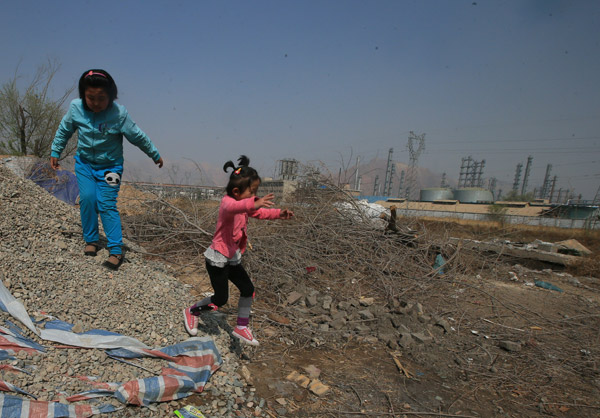Lanzhou gov't gives all clear for tap water
 0 Comment(s)
0 Comment(s) Print
Print E-mail China Daily, April 15, 2014
E-mail China Daily, April 15, 2014
Authorities in Lanzhou, capital of northwestern Gansu province, have resumed the supply of tap water to the city's urban districts on Monday after tests showed that the level of benzene in the water had dropped below national safety limits.
From Thursday evening to early Friday morning, Veolia Water, a Sino-French joint venture and the sole water supplier for urban Lanzhou, found between 118 and 200 micrograms of benzene per liter of water at their plants.
 |
|
Children play in a village in the Xigu district of Lanzhou in Gansu province on Sunday after contaminated tap water caused panic in the city on Friday. The incident exposed maintenance issues with China’s water supply pipelines. |
The company first detected high levels of benzene at around 5 pm on Thursday, but an announcement about the contamination was given 19 hours later. Both Veolia Water and the city government drew public criticism for the delayed announcement.
On its official micro blog, the city government announced it had conducted 10 tests on the tap water in Xigu district, where the benzene pollution is most severe. Tests showed that the level of benzene in the water was lower than national safety limits.
The authorities also announced that they will embark on a project to retrofit the concrete duct between Veolia's water stations to iron pipelines.
According to test results, the level of benzene at samples taken from Xigu district dropped to between zero and 8.58 micrograms per liter, lower than the national limit of 10 micrograms. The test results at Anning district also met national standards.
Benzene is a colorless carcinogenic compound used to manufacture plastics. It is known to damage the human hematopoietic system, which produces blood.
Authorities suspect that underground water mixed with residual oil in the duct running between two of the company's water stations, creating the contamination. The duct is located near a subsidiary of China National Petroleum Corp, the country's largest oil company.
A preliminary investigation by authorities said the contamination was caused by two residual oil leaks stemming from an oil tank explosion in 1987 and a fire in an oil pipeline in 2002.
The authority advised local residents to run their tap water for 15 to 30 minutes prior to usage and added that it will exempt residents from the cost of doing so on their water bills.
Zhang Piaomiao, a 36-year-old resident of Lanzhou who works in a consultancy company, said she is still afraid of drinking the tap water despite the go-ahead from authorities.
"The thought that I might have been drinking polluted water for decades saddens me. It seems to me that the government doesn't have the right attitude and has not taken the right actions to answer questions from residents," she said.
Yang Jingmin, 52, who owns a teahouse in the city's Xigu district, said her business will offer customers tea using boiled purified water.
"The authority should provide each resident in the district with a health check," she added.
The contamination incident also highlighted the city's urban planning problems. The water works are located between two oil refineries, according to experts.
In an article published in a local science journal in 2008, three staff members with Veolia Water in Lanzhou wrote that the duct between the two water stations at the plant, which was built in 1958, is constantly threatened by underground water mixed with oil.
"Currently there are gaps in the duct ... and the leak-proof materials on the duct are aging. Underground water mixed with oil are leaking in. ... In addition to the duct, other water supply facilities are faced with problems and the city's water safety is under severe threat," the article said.
Ma Jun, director of the Institute of Public and Environmental Affairs, an NGO that researches water issues in China, said the incident has exposed maintenance issues with China's water supply pipelines.
"The problem is not unique in Lanzhou. In some cities, the pipelines are serving beyond their shelf life and are in a poor state of maintenance," he said.
"With the quick pace of urbanization and lack of proper urban planning … it is not uncommon for tap water pipelines to be constructed together with oil pipelines or chemical engineering pipelines," he said.





